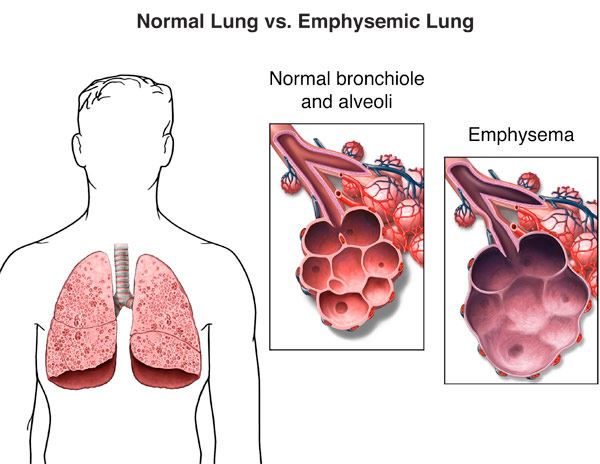Emphysema
Emphysema is a lung condition that causes shortness of breath. In people with emphysema, the air sacs in the lungs (alveoli) are damaged. Over time, the inner walls of the air sacs weaken and rupture. This creates larger air spaces instead of small ones. This reduces the surface area of the lungs and, in turn, the amount of oxygen that reaches your bloodstream. When you exhale, the damaged alveoli don't work properly and old air becomes trapped, leaving no room for fresh, oxygen-rich air to enter.
Emphysema is one of the conditions that makes up chronic obstructive pulmonary disease (COPD).

Medical Illustration Copyright © 2019 Nucleus Medical Media, All rights reserved.
Causes of Emphysema
The main cause of emphysema is cigarette smoking. However, other conditions, traits or habits may also play a role in raising your risk for this disease. These conditions are known as risk factors.
Non-Modifiable Risk Factors: These factors are irreversible and cannot be changed. The more of these risk factors you have, the greater your chance of developing this condition:
- Family history/genetics
- Older age between 40 and 60 years old
- Pre-existing asthma condition
Modifiable Risk Factors: These factors can be modified, treated or controlled through medications or lifestyle changes.
- Long history of cigarette smoking and/or drug abuse
- Exposure to secondhand smoke
Other conditions that may lead to developing of emphysema:
- Chronic bronchitis: Inflammation and irritation of the bronchial tubes.
- Air pollution: A mixture of solid particles and gases in the air (car emissions, chemicals from factories, dust, pollen, among others).
Symptoms of Emphysema
Emphysema symptoms often don't appear until significant lung damage has occurred. Some of the most common symptoms of emphysema include:
- Shortness of breath
- Wheezing
- You are not mentally alert
- Your lips or fingernails turn blue or gray with exertion
Diagnosis of Emphysema
To determine if you have emphysema, your doctor will ask about your medical history and do a physical exam. Your doctor may recommend a variety of diagnostic tests, including:
Treatment of Emphysema
Emphysema cannot be cured, but treatments can help relieve symptoms and slow the progression of the disease. Some treatment options include lifestyle changes, medications, and medical and surgical procedures.
Lifestyle Changes
- Avoid smoking.
- Make and keep appointments to see your doctor for routine check-ups and follow-up tests.
Medications
- Bronchodilators will help relax the muscles around your airways. This can help relieve coughing and shortness of breath and make breathing easier.
- Inhaled steroids will help reduce airway inflammation and help prevent exacerbations.
- Phosphodiesterase-4 inhibitors will help decrease airway inflammation and relaxes the airways.
